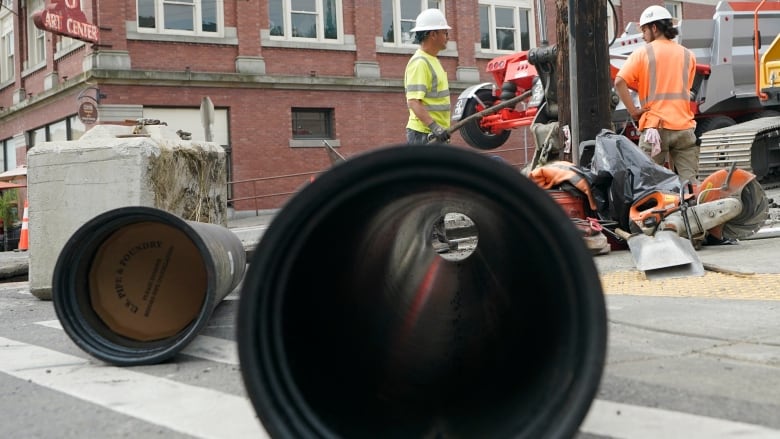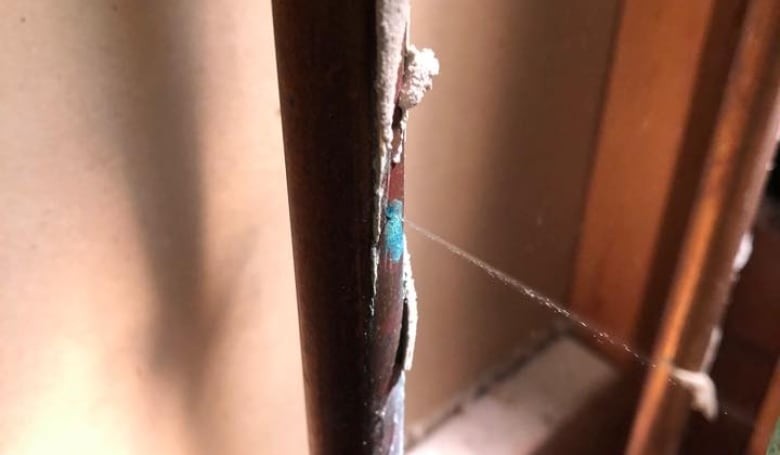Lawsuits against the City of Thunder Bay over leaky pipes continue winding through court
Certification motion hearing for proposed $350M class-action lawsuit slated for June

Legal action is progressing against the City of Thunder Bay related to pinhole leaks in people's pipes and a new court date in one case has been set for this spring.
In 2018, the city injecteda small amount of sodium hydroxide into the water supply to reduce the amount of lead seeping in from old lead pipes, which were estimated to be servicing between 7,500and 8,000 homes.
After the sodium hydroxide was added, complaints began to surface of pinhole leaks in people's pipes.Over time, hundreds of homeowners began to experience flooding and said the chemical in the water was to blame.
Many people believe the sodium hydroxide ate through their copper pipes, creating pinhole leaks requiring costly repairs. However, the city has never attributed the additive as the cause of the leaks.
Sodium hydroxide was removed from the water supply in early 2020. Since then, the city started supplying NSF/ANSI-53 approved water pitchers and filters to properties with known lead service pipes to reduce the lead in their water.
However, people are still complaining of leaky pipes. A Facebook group called The Thunder Bay Leaky Pipe Club, created in September 2020, has more than 3,900 members and two lawsuits remain in court.
A tale of two lawsuits
There are two lawsuits against the City of Thunder Bay related to the pinhole leaks:
- A $350,000 lawsuit launched by St. Joseph's Care Group, represented by Cheadles LLP of Thunder Bay, seeks damages related to leaking pipes at the P.R. Cook apartments on Carrie Street
- A $350-million proposed class-action lawsuit launched by plaintiff Patsy Stadnyk, represented by Toronto-based firm Roy O'Connor LLP, seeks damages to cover all residents, businesses and organizations whose pipes were damaged, or at risk of damage or failure, caused by the City's introduction of sodium hydroxide in the water supply
Both lawsuits were launched in the fall of 2020. None of the allegations have been proven in court.
A city spokesperson declined tocomment on the lawsuits and said the citywould address the issue in court.
The cityfiled a statement of defence in the St. Joseph's Care Group lawsuit in January 2021, denying all allegations. The statement says the city represented by Theall Group LLP based in Toronto was not negligent, and acted in a reasonable manner withdecisions made affecting the municipal water supply. It asks the judge to dismiss the case.

The St. Joseph's Care Group action is in the discovery phase, and is winding its way through the court process, said Jordan Lester, the lawyer for St. Joseph's.
"At this stage, the parties have exchanged their respective documents and the next step is to schedule [an] examination for discovery. I imagine that will be happening in the next few months," said Lester.
If the case goes to trial, it likely won't come before a judge until 2024, he said.
As for the much larger, class-action lawsuit, the plaintiff alleges the City of Thunder Bay owed alegal dutyto people, businesses and organizations supplied with city water to ensure the water supply did not unnecessarily corrode their pipes and plumbing systems,according to the plaintiff's lawyer.
The plaintiff alleges that by adding sodium hydroxide, thecityfailed in that duty, and there were other alternatives available to address the concerns with lead pipes,saidDavid O'Connor, a partner at Roy O'Connor LLP.
A certification motion hearing was firstscheduled for last Wednesday, but the date was moved to June 7 at 10 a.m. at the court's request. Justice Edward Belobaba, an experienced class-action judge, is hearing the case.
Essentially, the judge will determine if the case meets the "legal and factual tests" to be certified as a class proceeding.
"If the motion is successful, subject to any appeal, we will of course then press forward with the case on the merits and intend to do our best to establish that the City is responsible as alleged in the statement of claim," O'Connor said.
The city is defending itself and has denied liability in this case, he said.
If the certification is ordered by the judge, he estimates the case will go to trial between eight and 12 months after that. Then, Belobaba will decide if, and to what extent, the city may be liable for damages.
Corrosion control program for lead continues
Meanwhile, Thunder Bay released its 2022 Water Quality Report earlier this month.
CBC News requested an interview with Michelle Warywoda, the director of the city's environment division, to discuss the report and initiatives related to the City's lead pipes, but that request was turned down.
However, a communications person answered questions via email and said:
- Since 2018, the city has replaced 879 publicly-owned lead services with copper. More than 100 lead services are to be replaced in 2023.
- Since 2020, more than 8,000 NSF/ANSI-53 approved water filter pitcher kits have been distributed to properties with lead service connections. These properties have received replacement filters each year.
- The City has issued 69 interest-free loans since June 2020 to help homeowners replace private lead water service lines.












_(720p).jpg)


 OFFICIAL HD MUSIC VIDEO.jpg)
.jpg)



























































































